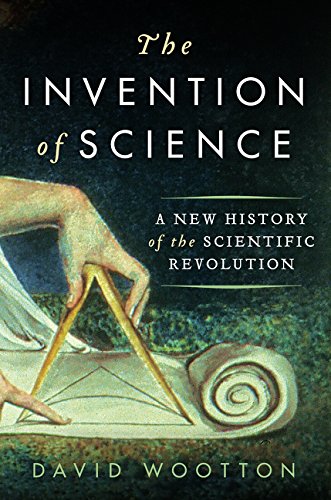(Part 2) Top products from r/HistoryofIdeas
We found 20 product mentions on r/HistoryofIdeas. We ranked the 124 resulting products by number of redditors who mentioned them. Here are the products ranked 21-40. You can also go back to the previous section.
21. The Swerve: How the World Became Modern
Sentiment score: 1
Number of reviews: 1
W W Norton Company
 Show Reddit reviews
Show Reddit reviews22. Why Empathy Matters: The Science and Psychology of Better Judgment
Sentiment score: 1
Number of reviews: 1
ISBN13: 9780143116615Condition: NewNotes: BRAND NEW FROM PUBLISHER! 100% Satisfaction Guarantee. Tracking provided on most orders. Buy with Confidence! Millions of books sold!
 Show Reddit reviews
Show Reddit reviews23. The Suit: A Machiavellian Approach to Men's Style
Sentiment score: 1
Number of reviews: 1
HarperCollins Publishers
 Show Reddit reviews
Show Reddit reviews24. The Invention of Science: A New History of the Scientific Revolution
Sentiment score: 0
Number of reviews: 1
Harper
 Show Reddit reviews
Show Reddit reviews26. Ludwig Wittgenstein: The Duty of Genius
Sentiment score: 1
Number of reviews: 1
VINTAGE
 Show Reddit reviews
Show Reddit reviews27. An Outline of European Architecture (Penguin Art and Architecture Series)
Sentiment score: 1
Number of reviews: 1
 Show Reddit reviews
Show Reddit reviews28. The Portable Jung (Portable Library)
Sentiment score: 1
Number of reviews: 1
Penguin Books
 Show Reddit reviews
Show Reddit reviews30. Longitude: The True Story of a Lone Genius Who Solved the Greatest Scientific Problem of His Time
Sentiment score: 0
Number of reviews: 1
 Show Reddit reviews
Show Reddit reviews31. The Epic of Gilgamesh (Penguin Classics)
Sentiment score: 0
Number of reviews: 1
Penguin Books
 Show Reddit reviews
Show Reddit reviews32. The Modern Mind: An Intellectual History of the 20th Century
Sentiment score: 0
Number of reviews: 1
 Show Reddit reviews
Show Reddit reviews33. Christianity: The First Three Thousand Years
Sentiment score: 0
Number of reviews: 1
Penguin Books
 Show Reddit reviews
Show Reddit reviews34. The House of Wisdom: How Arabic Science Saved Ancient Knowledge and Gave Us the Renaissance
Sentiment score: 0
Number of reviews: 1
Penguin Books
 Show Reddit reviews
Show Reddit reviews35. Weavers of Revolution: The Yarur Workers and Chile's Road to Socialism
Sentiment score: 0
Number of reviews: 1
 Show Reddit reviews
Show Reddit reviews36. Civic Virtues: Rights, Citizenship, and Republican Liberalism (Oxford Political Theory)
Sentiment score: 1
Number of reviews: 1
 Show Reddit reviews
Show Reddit reviews37. Machiavelli (Founders of Modern Political and Social Thought)
Sentiment score: 0
Number of reviews: 1
 Show Reddit reviews
Show Reddit reviews38. Choosing Terror: Virtue, Friendship, and Authenticity in the French Revolution
Sentiment score: 0
Number of reviews: 1
 Show Reddit reviews
Show Reddit reviews



From the book's Amazon description:
> In the first detailed, chapter-by-chapter reading of the Prince in any language, Erica Benner shows that the book is a masterpiece of ironic writing. Machiavelli's style is deliberately ambiguous: he often seems to say one thing, but gives readers clues that point toward a very different message. Beyond its 'Machiavellian' surface, the Prince has a surprisingly moral purpose. It teaches readers how to recognize hidden dangers in political conduct that merely appears great or praiseworthy - and to mistrust promises of easy solutions to political problems.
> This highly engaging new interpretation helps readers to see beyond the Prince's deceptive first appearances. Benner sets out Machiavelli's main ironic techniques at the outset, especially his coded use of words to signal praise or blame. Once readers become familiar with these codes, they will find it easier to grasp the Prince's surreptitiously pro-republican message - and its powerful critique of charismatic one-man rule and imperial politics.
More posts about Machiavelli.
If you care about building a better society it's important to understand why people have the moral intuitions they do, so you can work with people of varying moral intuitions to create a society that more closely matches our shared values.
For decent intros to the field, see Haidt's The Righteous Mind and Greene's Moral Tribes: Emotion, Reason, and the Gap Between Us and Them(especially the first half, the second part where he proposes a one size fits all meta-morality is, well, less convincing).
For an example of a practical application, see Haidt's Asteroids Club. I have trouble drawing lines between moral psychology and behavioral economics, so I'll include J.D. Trout's Why Empathy Matters: The Science and Psychology of Better Judgment as the policy side practical application as well, even though it leans on behavioral economic research at least as heavily as moral psychology. The only thing I don't like about the book is the fact that the title highlights empathy, while that's not really a key theme of the book, thankfully. There have been way too many people overplaying empathy lately IMHO.
If you like/can stand religious language, Richard Beck's "Unclean" and "Slavery of Death" are great too, based on both his own and other's research in moral psychology and terror management theory (which I'd put in the same umbrella).
I encourage you to start out with “The Portable Jung”, which is edited by Joseph Campbell.
The Portable Jung (Portable Library) https://www.amazon.com/dp/0140150706/ref=cm_sw_r_cp_api_i_aPU4CbVD7J8S3
Which one: Pathfinders (2010) or House of Wisdom (2012)? Can you recommend a review? This is something I've wanted to read more about since listening to the History of Philosophy without any gaps, but haven't had a chance to, yet.
> How about "Ideas: A History of Thought and Invention, from Fire to Freud"
There is also a "sequel" of sorts, The Modern Mind: An Intellectual History of the 20th Century that is worth considering.
[](/a06 "What? No mention of the Peterson Projection??") Longitude by Dava Sobel is also a fun little read.
Who needs a newly translated one. Here's one you can pick up on Amazon.
http://www.amazon.com/Epic-Gilgamesh-Penguin-Classics/dp/0140449191/ref=sr_1_1?s=books&ie=UTF8&qid=1394091321&sr=1-1&keywords=epic+of+gilgamesh
Peter Winn: Weavers of Revolution: The Yarur Workers and Chile's Road to Socialism